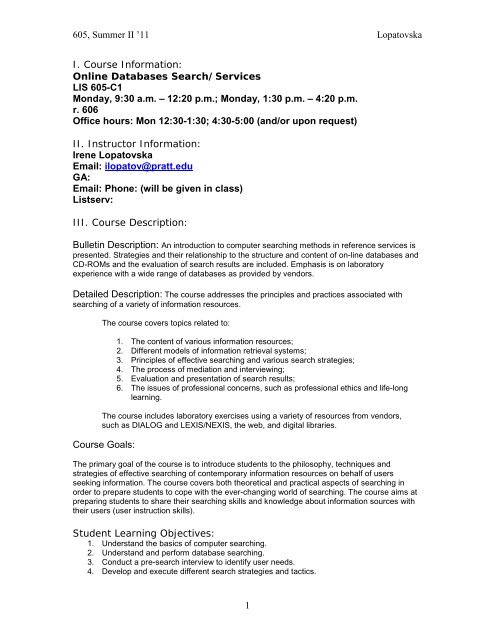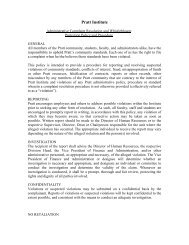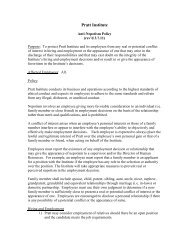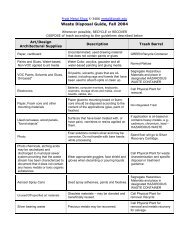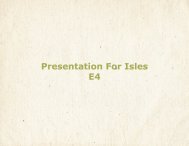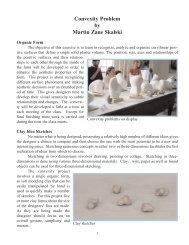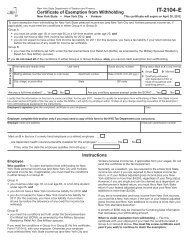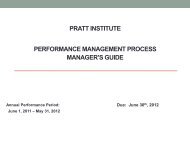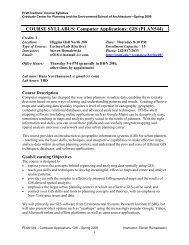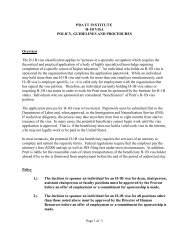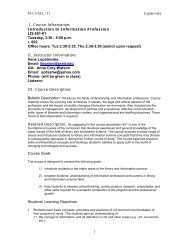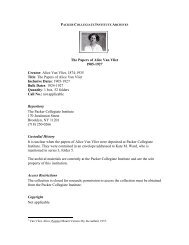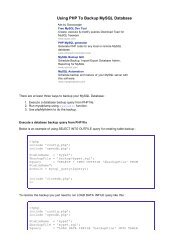Sample Syllabus - Pratt Institute
Sample Syllabus - Pratt Institute
Sample Syllabus - Pratt Institute
Create successful ePaper yourself
Turn your PDF publications into a flip-book with our unique Google optimized e-Paper software.
605, Summer II ’11 Lopatovska<br />
I. Course Information:<br />
Online Databases Search/Services<br />
LIS 605-C1<br />
Monday, 9:30 a.m. – 12:20 p.m.; Monday, 1:30 p.m. – 4:20 p.m.<br />
r. 606<br />
Office hours: Mon 12:30-1:30; 4:30-5:00 (and/or upon request)<br />
II. Instructor Information:<br />
Irene Lopatovska<br />
Email: ilopatov@pratt.edu<br />
GA:<br />
Email: Phone: (will be given in class)<br />
Listserv:<br />
III. Course Description:<br />
Bulletin Description: An introduction to computer searching methods in reference services is<br />
presented. Strategies and their relationship to the structure and content of on-line databases and<br />
CD-ROMs and the evaluation of search results are included. Emphasis is on laboratory<br />
experience with a wide range of databases as provided by vendors.<br />
Detailed Description: The course addresses the principles and practices associated with<br />
searching of a variety of information resources.<br />
The course covers topics related to:<br />
1. The content of various information resources;<br />
2. Different models of information retrieval systems;<br />
3. Principles of effective searching and various search strategies;<br />
4. The process of mediation and interviewing;<br />
5. Evaluation and presentation of search results;<br />
6. The issues of professional concerns, such as professional ethics and life-long<br />
learning.<br />
The course includes laboratory exercises using a variety of resources from vendors,<br />
such as DIALOG and LEXIS/NEXIS, the web, and digital libraries.<br />
Course Goals:<br />
The primary goal of the course is to introduce students to the philosophy, techniques and<br />
strategies of effective searching of contemporary information resources on behalf of users<br />
seeking information. The course covers both theoretical and practical aspects of searching in<br />
order to prepare students to cope with the ever-changing world of searching. The course aims at<br />
preparing students to share their searching skills and knowledge about information sources with<br />
their users (user instruction skills).<br />
Student Learning Objectives:<br />
1. Understand the basics of computer searching.<br />
2. Understand and perform database searching.<br />
3. Conduct a pre-search interview to identify user needs.<br />
4. Develop and execute different search strategies and tactics.<br />
1
605, Summer II ’11 Lopatovska<br />
5. Evaluate various electronic information sources.<br />
6. Present search results to the end user.<br />
7. Continue building familiarity with various electronic resources in varying disciplines,<br />
domains and formats.<br />
8. Be prepared to instruct users about electronic sources and search techniques.<br />
Course Calendar/Schedule [subject to change]:<br />
Wee<br />
k<br />
#<br />
Lectures &<br />
Practice<br />
Readings<br />
Assignmen<br />
ts*<br />
1 Jun<br />
27<br />
Course Overview<br />
Introduction to<br />
<strong>Pratt</strong> Online<br />
Resources<br />
(WilsonWeb,<br />
Gale, JSTOR,<br />
EBSCO)<br />
Bush, V. (1945). As we may think. Atlantic Monthly. Available<br />
at: http://www.theatlantic.com/doc/194507/bush<br />
Introduction to<br />
term project<br />
2 Jun<br />
27<br />
User Modeling<br />
and mediation<br />
Ross, C. S. (2003). The reference interview: why it needs to<br />
be used in every (well, almost every) reference transaction.<br />
Reference and User Services Quarterly, 43 (1), 38-41<br />
Wilson, T. (2004). Talking about the problem: a content<br />
analysis of pre-search interviews. Information Research, 10<br />
(1), paper 206.<br />
Prepare a list<br />
questions that<br />
would be<br />
appropriate in<br />
(almost) any<br />
reference<br />
interview [not<br />
graded]<br />
3/4 Jul 4 NO CLASS Work on term project<br />
2
605, Summer II ’11 Lopatovska<br />
5 Jul<br />
11<br />
Construction of<br />
Information<br />
Resources.<br />
Information<br />
Retrieval Models<br />
Boolean Logic.<br />
Vocabulary in<br />
Searching<br />
Bates, M.J. (1988). How to use controlled vocabulary<br />
effectively in searching. Online, 12(6), 45-56.<br />
Ojala, M. (2007). Finding and using the magic words:<br />
Keywords, thesauri and free text search. Online, 31(4), 40-42.<br />
Bell, S. (2007). Tools every searcher should know and use.<br />
Online (Wilton, Connecticut), 31(5), 22-27.<br />
Tenopir, C. (2008).Online systems for information access and<br />
retrieval. Library Trends, 56(4), 816-829.<br />
Jarvelin, K. & Wilson, T.D. (2003). On conceptual models for<br />
information seeking and retrieval research, Information<br />
Research, paper 163, available at: http://informationr.net/ir/9-<br />
1/paper163.html<br />
Project<br />
Deliverable –<br />
progress<br />
report – due<br />
discuss initial<br />
results<br />
6 Jul<br />
11<br />
Introduction to<br />
Proquest<br />
databases and<br />
Dialog<br />
http://support.dialog.com/dialogclassicweb/support/ Dialog -<br />
exercise 1<br />
7 Jul<br />
18<br />
Search strategies Notess, G.R. (2008). Speed searching. Online (Wilton,<br />
Connecticut), 32(2), 41-44.<br />
Goldsborough, R. (2006). Helping site visitors find what they<br />
are after. Teacher Librarian, 34(2), 52.<br />
De Braal, B. (2008). The right tool for your search job.<br />
Information World Review, issue 250.<br />
Hock, R. (2008). The elements of advanced search. Online<br />
(Wilton, Connecticut), 32 (4), 14-19.<br />
Salim, J. & Ming, D. C. (2004). Information skills: perspectives<br />
an alternatives in search strategies.<br />
Malaysian Journal of Library & Information Science, 9, no.2,<br />
Dec: 79-94<br />
Bates, M. (1989). The design of browsing and berrypicking<br />
techniques for the online search interface. Online Review, 13<br />
(5), 407-424, or at<br />
http://www.gseis.ucla.edu/faculty/bates/berrypicking.html<br />
8 Jul<br />
18<br />
Factiva<br />
Lexis-Nexis<br />
Review Factiva Training Modules 1, 2, 3, 4, 5 at:<br />
http://www.proquest.com/en-<br />
US/support/training/materials.shtml<br />
Factiva and<br />
Nexis for<br />
business<br />
information –<br />
exercise 2<br />
9 Jul<br />
25<br />
Search engines<br />
Digital libraries<br />
Gunn, H. (2006). New in Web Search. Teacher Librarian,<br />
34(1), 62-3.<br />
Brophy, J. & Bawden, D. (2005). Is Google enough?<br />
3
605, Summer II ’11 Lopatovska<br />
Data repositories<br />
Social media<br />
sites<br />
Comparison of an internet search engine with academic library<br />
resources. Aslib Proceedings New Information Perspectives.<br />
57(6), 498-512.<br />
Segal, D. (February 12, 2011). The Dirty Little Secrets of<br />
Search. The New york Times. Available at:<br />
http://www.nytimes.com/2011/02/13/business/13search.html?_<br />
r=2&pagewanted=print<br />
Google, Zeitgeist 2010: How the world searched. Available at:<br />
http://www.google.com/intl/en/press/zeitgeist2010/<br />
Devine, J. & Sider, F. S. (2007) Beyond Google: The invisible<br />
Web. Retrieved May. 19, 2011 from<br />
http://library.lagcc.cuny.edu/invisibleweb/default.htm<br />
Schilit, B. N. & Kolak, O. (2008). Exploring a digital library<br />
through key ideas. Proceedings of the 8th ACM/IEEE-CS joint<br />
conference on digital libraries. 177 - 186. In: ACM Digital<br />
Library.<br />
Nicholson, S., Sierra, T., Eseryel, U. Yeliz, Park, Ji-Hong,<br />
Barkow, P. Pozo, E. J. and Ward, J. (2006). How Much of It Is<br />
Real? Analysis of Paid Placement<br />
in Web Search Engine Results, Journal of the American<br />
Society for Information Science and Technology, 57(4), 448-<br />
461. Available at:<br />
http://biblio.syr.edu/bibliomining/articles/nicholsonads.html<br />
Brin, S. and Page L. The Anatomy of a Large-Scale<br />
Hypertextual Web Search Engine, available at:<br />
http://clgiles.ist.psu.edu/IST441/materials/papers/anatomysearch-engine-pagerank.pdf<br />
Google pageranked explained:<br />
http://www.webworkshop.net/pagerank.html<br />
Schwartz, C. (2000). Digital libraries: an overview. The<br />
Journal of Academic Librarianship, 26(6), 385-393.<br />
Liu, Z. (2006). Print vs. electronic resources: a study of user<br />
perceptions, preferences, and use Information Processing and<br />
Management: an International Journal, 42(2), 583 – 592.<br />
Reference and User Services Association (RUSA). Best Free<br />
Reference Web Sites 2010<br />
Twelfth Annual List:<br />
http://www.ala.org/ala/mgrps/divs/rusa/sections/mars/marspub<br />
s/marsbestfreewebsites/marsbestfree2010.cfm<br />
Notess, G. R. (2008). Searching the twitter realm. Online<br />
(Wilton, Connecticut), 32(4), 43-45.<br />
4
605, Summer II ’11 Lopatovska<br />
10 Jul<br />
25<br />
Evaluation of<br />
Information<br />
Sources and<br />
Search Results<br />
Stephen, A. E. (2005). Relevance and the End of Objective<br />
Hits. Online 29(5), 16-21. Available at:<br />
http://www.arnoldit.com/articles/seo-Google-Relevancyranking-issues.pdf<br />
Evaluation of<br />
search results<br />
– exercise 3<br />
Toms, E. G., & Taves, A. R. (2004). Measuring user<br />
perceptions of Web site reputation. Information Processing &<br />
Management, 40(2), 291-317.<br />
11 Aug<br />
1<br />
Search ethics<br />
Feldman, S. (2002). This is what I asked for? The searching<br />
quagmire. Chapter 9 in: Mintz. A. P. ed. Web of deception.<br />
Misinformation on the Internet. Medford, NJ Information<br />
Today. (pp. 175-195).<br />
ALA Code of Ethics:<br />
http://www.ala.org/ala/aboutala/offices/oif/statementspols/code<br />
ofethics/codeethics.cfm<br />
Isaacson, D. (2004). Is the correct answer the right one?<br />
Journal of information ethics, 13 (1), 14-18.<br />
Symons, A. K. & Stoffle, C. (1998). When Values Conflict.<br />
American Libraries 29(5), 56-58.<br />
Iacovino, L. (2002). Ethical principles and information<br />
professionals: theory, practice and education. Australian<br />
Academic & Research Libraries, 33 (2), 57-74.<br />
Busha, C. H., & Wedgeworth, R. Censorship and Intellectual<br />
Freedom. In Wedgeworth, R. (Ed.), World Encyclopedia of<br />
Library and Information Services, (3rd ed.). Chicago: American<br />
Library Association. 1993: 182-185.<br />
Project<br />
Deliverable<br />
due<br />
12 Aug<br />
1<br />
Presentation of<br />
Search Results<br />
------------------<br />
Searcher<br />
Development<br />
Kassel, A. (2002). Value-added deliverables: Rungs on the<br />
info pro's ladder to success. Searcher, 10(10), 42-53.<br />
Kangiser, A., & Olson, C. (2004). Use Branded Deliverables to<br />
Increase Recognitions and Visibility. Searcher, 12(7), 50-6.<br />
H.W. Wilson Library Literature & Information Science Full-Text<br />
database.<br />
-------------<br />
Auster, E., & Chan, D. C. (2004). Reference librarians and<br />
keeping up-to-date: A question of priorities. Reference & User<br />
Services Quarterly, 44 (1), 57-66.<br />
Abram. S. (2008). Evolution to revolution to chaos? Reference<br />
in transition. Available at:<br />
http://www.infotoday.com/searcher/sep08/Abram.shtml<br />
Nicholas, D., Williams, P., Huntington, P., Fieldhouse, M.,<br />
Gunter, B., Withey, R., Jamali, H. R., Dobrowoiski, T. &<br />
Tenopir, C. (2008) The Google generation: the information<br />
5
605, Summer II ’11 Lopatovska<br />
behaviour of the researcher of the future. Aslib Proceedings,<br />
60(4), 290-310.<br />
Houghton-Jan, S. (2008). Tools for Keeping Current.<br />
PowerPoint presentation retrieved Apr. 13, 2011 from:<br />
http://librarianinblack.typepad.com/librarianinblack/files/tools_f<br />
or_staying_current_azlarefconf2008.pdf<br />
IV. Course Requirements<br />
ASSIGNMENTS<br />
All assignments must be completed to receive a passing grade in the course.<br />
Assignments must be submitted on time, so that they can be graded consistently and discussed<br />
in the class session following the due date. Put the date of submission on the cover page as well<br />
as your name, the course number, and the title of the assignment.<br />
Except for documented medical and family emergencies, assignments submitted late will receive<br />
a lower grade, for the following reasons:<br />
a) students who take more time to prepare their assignments have an unfair advantage over<br />
their classmates; (b) students who submit their assignments late often benefit from the<br />
review in class of their colleagues' errors.<br />
All assignments must be submitted electronically via email.<br />
Term project (deliverables I, II and Discussion)<br />
The term project is designed for you to perform a search on behalf of a real user. As part<br />
of the project you will conduct the following activities:<br />
1) Interview your user to find his/her information need.<br />
2) Select information sources, select appropriate search strategies and perform<br />
search.<br />
3) Evaluate your results and make necessary adjustments to your search<br />
strategies.<br />
4) Present results of your search to a user.<br />
5) Keep records of steps 1 – 4 and prepare a two-part deliverable based on<br />
your experiences.<br />
Project Deliverable:<br />
Part 1 – explain your search decisions<br />
• Provide rationale for selecting information sources. Describe your search: what<br />
keywords/concepts did you use and how did you modify them as you proceeded with<br />
the search? Did you use controlled vocabulary? What database<br />
functionality/navigation options did you use, etc?<br />
6
605, Summer II ’11 Lopatovska<br />
• Describe your evaluation techniques. Did you compare several results? How did you<br />
select the final answer for the user? Did you have to refine your search strategies in<br />
the search process, and if so, why?<br />
• Describe your experience, what you learned, what you would have done differently.<br />
Note: Part 1 is intended to show the instructor your understanding of the searching<br />
strategies and familiarity with the various information resources. It should be detailed<br />
enough so that you can replicate your search path in the future if necessary.<br />
Part 2.<br />
• Prepare information packet for your user (e.g. summarize your results, include<br />
bibliography, abstracts and/or full text)<br />
Note: Part 2 will be given to the user; it should demonstrate your information<br />
organization, evaluation and presentation skills.<br />
Format<br />
It is important to follow consistent format for all your assignments. The suggested format<br />
is APA [the course bibliography is an example of the APA style]:<br />
Publication Manual of the American Psychological Association (2001). (5th ed.). Washington, D.C:<br />
American Psychological Association.<br />
All written assignments must have the following information in the top left corner of the front page:<br />
student’s name,<br />
course number,<br />
assignment or exercise number as listed in the <strong>Syllabus</strong><br />
If references to other works (articles, books...) are included in the summary, they must be<br />
properly cited in the summary, e.g. Tenopir (2004).<br />
Exercises<br />
Exercises are designed to help you master searching skills. Exercises will consist of practical<br />
tasks related to searching. For example, you will be asked to use DIALOG, LexisNexis, web<br />
search engines, and library resources to search for answers to given questions or explore<br />
features of these systems. Exercise problems will be given in class; most of the work on<br />
exercises will be done in class.<br />
The more thorough the execution and presentation of results the higher the grade!<br />
Participation<br />
We will be discussing readings and assignments in class. The higher and more<br />
substantive participation the higher the grade!<br />
7
605, Summer II ’11 Lopatovska<br />
Student conduct and grading<br />
Missing classes<br />
When you have to miss a class, please, notify the instructor and submit a 0.5-1 page summary of<br />
an article/chapter that you have read for the missing class.<br />
Students with 3 absences* (for any reason, including documented medical reasons) can not<br />
expect to receive an A in the course<br />
Students with 4 absences* or more will be asked to drop the course<br />
Email communication<br />
Please, include class number (LIS605) in the subject line of all your class related<br />
correspondence. Include assignment number/title. Try to be courteous and professional<br />
and ALWAYS include your name in the body of the message.<br />
Grading:<br />
A = 4.0<br />
A- = 3.7<br />
B+ = 3.3<br />
B = 3.0<br />
B- = 2.7<br />
C+ = 2.3<br />
C = 2.0<br />
F = 0<br />
For details on <strong>Pratt</strong> <strong>Institute</strong> grading system please refer to the Graduate Bulletin.<br />
Grades for students’ work will be determined as follows:<br />
Exercise 1: 10%<br />
Exercise 2: 10%<br />
Exercise 3: 10%<br />
Project deliverable: 35%<br />
Participation: 35%<br />
TOTAL 100%<br />
Policies<br />
<strong>Institute</strong>-wide policies listed in the “Community Standards” section of the bulletin.<br />
8


